选择大公司还是小公司英语作文
选择大公司还是小公司的英语作文

Choosing Big Corporations or Small Firms: A Dilemma for Job SeekersIn the realm of job hunting, the decision of whether to choose a big corporation or a small firm often poses a dilemma for aspirants. Each option carries its own set of advantages and disadvantages, making the choice a complex one that requires careful consideration.The lure of big corporations is undeniable. They offer a sense of stability and security, with established brands, robust financial backing, and often, a wide array of career development opportunities. Working for a large company can expose individuals to a diverse range of projects and experiences, providing them with the opportunity to learn and grow within a structured environment. Additionally, big corporations often offer comprehensive training programs and mentorship schemes, which can help newcomers acclimate to the industry and develop their skills.Moreover, working for a big company can also lead to greater network opportunities. These firms typically have a larger employee base, meaning more opportunities to meet and collaborate with peers across different departments andhierarchies. Such networks can be invaluable in terms of career advancement and professional growth.However, the advantages of big corporations are not without their costs. The bureaucracy and hierarchy within these organizations can sometimes lead to sluggishdecision-making and a lack of flexibility. The larger the company, the more layers of management there are to navigate, which can slow down the pace of work and和创新精神。
毕业生应该在大公司还是小公司工作英语作文
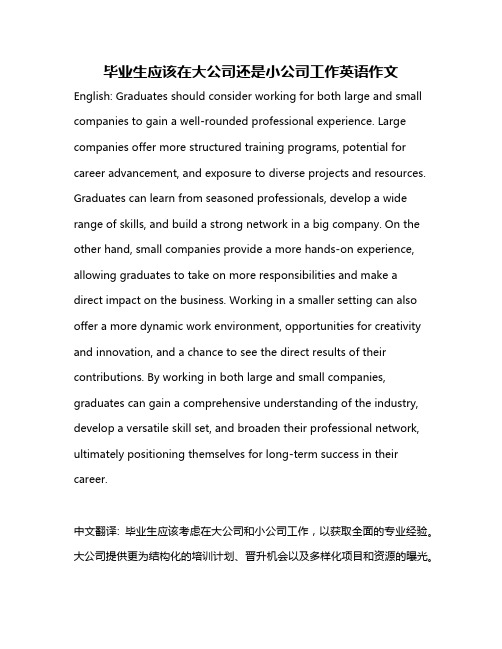
毕业生应该在大公司还是小公司工作英语作文English: Graduates should consider working for both large and small companies to gain a well-rounded professional experience. Large companies offer more structured training programs, potential for career advancement, and exposure to diverse projects and resources. Graduates can learn from seasoned professionals, develop a wide range of skills, and build a strong network in a big company. On the other hand, small companies provide a more hands-on experience, allowing graduates to take on more responsibilities and make a direct impact on the business. Working in a smaller setting can also offer a more dynamic work environment, opportunities for creativity and innovation, and a chance to see the direct results of their contributions. By working in both large and small companies, graduates can gain a comprehensive understanding of the industry, develop a versatile skill set, and broaden their professional network, ultimately positioning themselves for long-term success in their career.中文翻译: 毕业生应该考虑在大公司和小公司工作,以获取全面的专业经验。
你认为大公司好还是小公司好的英语作文
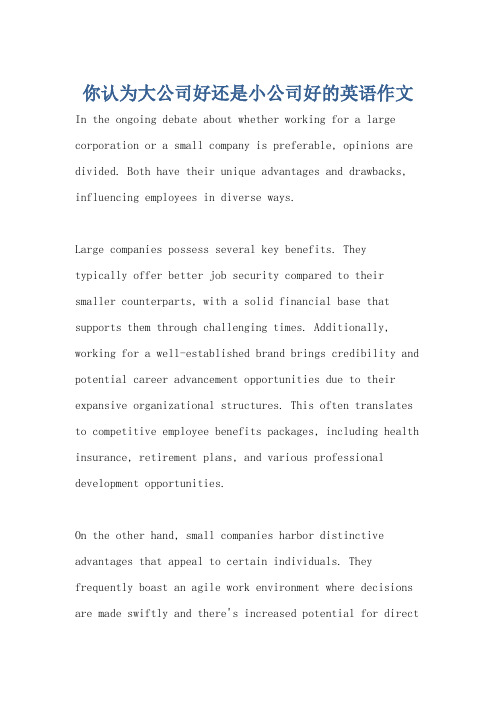
你认为大公司好还是小公司好的英语作文In the ongoing debate about whether working for a large corporation or a small company is preferable, opinions are divided. Both have their unique advantages and drawbacks, influencing employees in diverse ways.Large companies possess several key benefits. Theytypically offer better job security compared to their smaller counterparts, with a solid financial base that supports them through challenging times. Additionally, working for a well-established brand brings credibility and potential career advancement opportunities due to their expansive organizational structures. This often translates to competitive employee benefits packages, including health insurance, retirement plans, and various professional development opportunities.On the other hand, small companies harbor distinctive advantages that appeal to certain individuals. They frequently boast an agile work environment where decisions are made swiftly and there's increased potential for directinfluence on the organization's trajectory. This can foster a sense of ownership as one’s contributions are more visibly impactful. Furthermore, small companies often provide more autonomy and closer-knit relationships between colleagues due to their compact size.Nonetheless, large corporations have been plagued by criticisms of bureaucracy and rigid hierarchies that may stifle creativity and individuality among employees. Conversely, while small businesses offer greaterflexibility and personal connection among colleagues, they may struggle to match the resources available at larger firms.When considering which type of company is preferable to work for, it is essential to take into account personal career goals and priorities. For those seeking stability and structured career paths with abundant resources for growth or specific benefits packages, a large enterprise may be more suitable. Conversely, individuals hungry for roles with diverse responsibilities allowing significant impact on the company's direction might find themselvesbetter suited to smaller teams.Ultimately, the choice between working for a large or small company hinges on an individual’s values, aspirations,risk tolerance as well as preferred working environment. While discussions regarding this topic abound with varying opinions based on personal experiences and preferences –neither option is categorically superior; rather both present different pros and cons catering to distinct professional inclinations.。
大公司小公司的选择英语作文
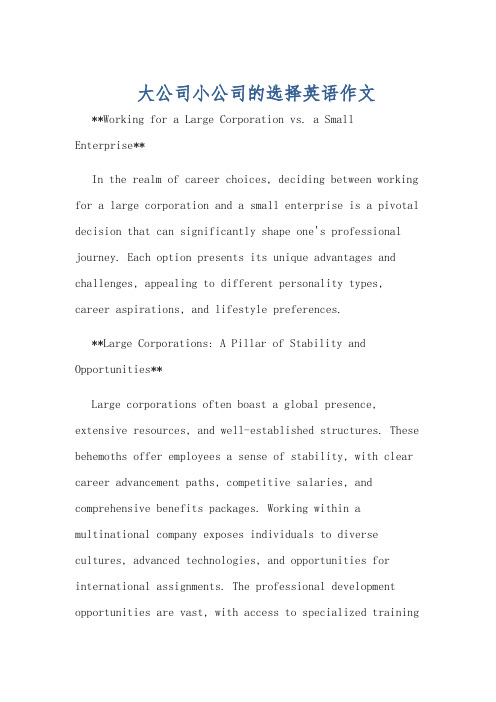
大公司小公司的选择英语作文**Working for a Large Corporation vs. a SmallEnterprise**In the realm of career choices, deciding between working for a large corporation and a small enterprise is a pivotal decision that can significantly shape one's professional journey. Each option presents its unique advantages and challenges, appealing to different personality types, career aspirations, and lifestyle preferences.**Large Corporations: A Pillar of Stability and Opportunities**Large corporations often boast a global presence, extensive resources, and well-established structures. These behemoths offer employees a sense of stability, with clear career advancement paths, competitive salaries, and comprehensive benefits packages. Working within a multinational company exposes individuals to diverse cultures, advanced technologies, and opportunities for international assignments. The professional development opportunities are vast, with access to specialized trainingprograms and mentorship from industry experts. However, the hierarchical nature of these organizations may result in slower decision-making processes and a feeling of being a small cog in a giant machine. The bureaucracy can stifle creativity and innovation for those seeking a more agile work environment.**Small Enterprises: Agility and Personal Impact**On the other hand, small enterprises provide a more intimate and flexible work setting. Here, employees havethe chance to wear multiple hats, gaining exposure to various aspects of the business. This hands-on experience fosters a steep learning curve and enables individuals to make tangible contributions to the company's growth from early on. The flat organizational structure promotes open communication, closer relationships with colleagues, and quicker decision-making. For those who thrive in dynamic environments and seek a sense of ownership, small companies can be highly rewarding. Nevertheless, they might lack the financial security and extensive resources of larger corporations, and career progression can be less structured.**Conclusion**Ultimately, the choice between a large corporation and a small enterprise depends on one's personal priorities and career goals. If you value stability, structured growth, and a broad professional network, a large corporation could be your ideal fit. Conversely, if you seek a dynamic environment, direct impact, and a family-like workplace culture, a small enterprise might align better with your aspirations. Both paths offer valuable experiences; it's about finding where you can flourish and contribute most meaningfully.---**在大型企业与小型企业之间工作**在职业选择的领域里,决定是在大型企业还是小型企业工作,是一个能显著塑造个人职业道路的关键决策。
工作选择大公司还是小公司英语作文
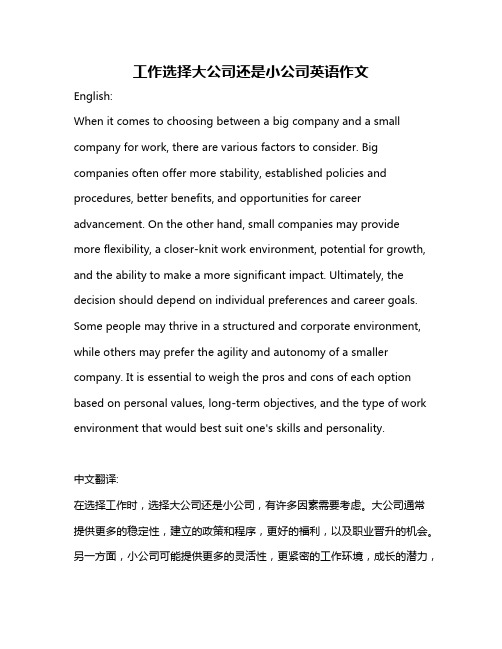
工作选择大公司还是小公司英语作文English:When it comes to choosing between a big company and a small company for work, there are various factors to consider. Big companies often offer more stability, established policies and procedures, better benefits, and opportunities for career advancement. On the other hand, small companies may provide more flexibility, a closer-knit work environment, potential for growth, and the ability to make a more significant impact. Ultimately, the decision should depend on individual preferences and career goals. Some people may thrive in a structured and corporate environment, while others may prefer the agility and autonomy of a smaller company. It is essential to weigh the pros and cons of each option based on personal values, long-term objectives, and the type of work environment that would best suit one's skills and personality.中文翻译:在选择工作时,选择大公司还是小公司,有许多因素需要考虑。
你认为大公司好还是小公司好的英语作文
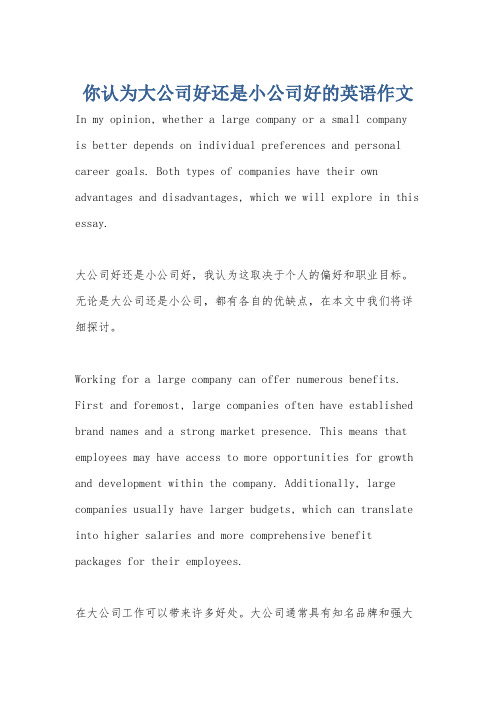
你认为大公司好还是小公司好的英语作文In my opinion, whether a large company or a small company is better depends on individual preferences and personal career goals. Both types of companies have their own advantages and disadvantages, which we will explore in this essay.大公司好还是小公司好,我认为这取决于个人的偏好和职业目标。
无论是大公司还是小公司,都有各自的优缺点,在本文中我们将详细探讨。
Working for a large company can offer numerous benefits. First and foremost, large companies often have established brand names and a strong market presence. This means that employees may have access to more opportunities for growth and development within the company. Additionally, large companies usually have larger budgets, which can translate into higher salaries and more comprehensive benefit packages for their employees.在大公司工作可以带来许多好处。
大公司通常具有知名品牌和强大的市场影响力。
这意味着员工可能会在公司内部获得更多的成长和发展机会。
大公司往往拥有更高额的预算,这可能会转化为员工薪水更高、福利更全面。
工作选择大公司还是小公司英语作文
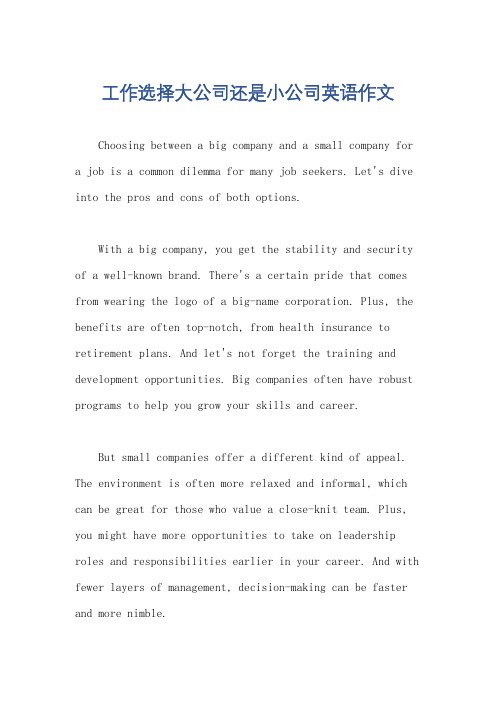
工作选择大公司还是小公司英语作文Choosing between a big company and a small company for a job is a common dilemma for many job seekers. Let's dive into the pros and cons of both options.With a big company, you get the stability and security of a well-known brand. There's a certain pride that comes from wearing the logo of a big-name corporation. Plus, the benefits are often top-notch, from health insurance to retirement plans. And let's not forget the training and development opportunities. Big companies often have robust programs to help you grow your skills and career.But small companies offer a different kind of appeal. The environment is often more relaxed and informal, which can be great for those who value a close-knit team. Plus, you might have more opportunities to take on leadership roles and responsibilities earlier in your career. And with fewer layers of management, decision-making can be faster and more nimble.On the flip side, small companies might not have the financial resources to offer competitive salaries or extensive benefits. And while there's certainly room for growth, the overall opportunities might be more limited compared to a big company.Ultimately, it's a personal decision that depends.。
毕业后去大公司工作还是小公司好英语作文
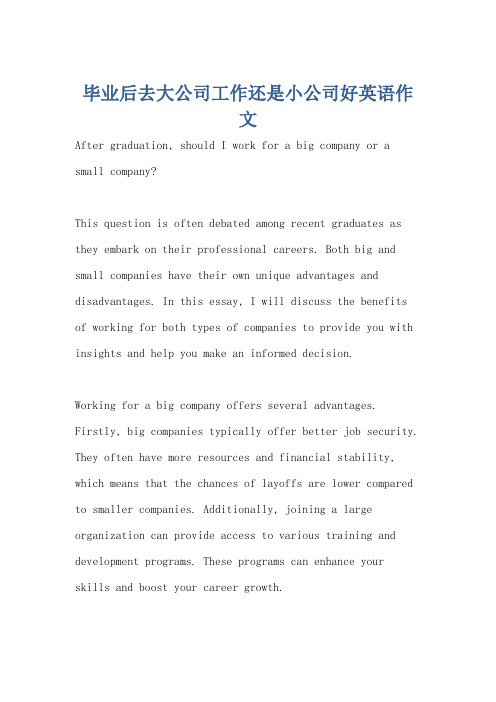
毕业后去大公司工作还是小公司好英语作文After graduation, should I work for a big company or a small company?This question is often debated among recent graduates as they embark on their professional careers. Both big and small companies have their own unique advantages and disadvantages. In this essay, I will discuss the benefits of working for both types of companies to provide you with insights and help you make an informed decision.Working for a big company offers several advantages. Firstly, big companies typically offer better job security. They often have more resources and financial stability, which means that the chances of layoffs are lower compared to smaller companies. Additionally, joining a large organization can provide access to various training and development programs. These programs can enhance yourskills and boost your career growth.However, there are also drawbacks to consider when working for big corporations. One downside is that employees may feel like just a small cog in a large machine due to the hierarchical structure of these organizations. This could potentially hinder creativity and innovation because decision-making processes may be slow and bureaucratic. Moreover, employees might face more intense competition within the company since there are often more employees vying for promotions.On the other hand, working for a small company has its own set of benefits. One advantage is that it offers greater opportunities for learning and taking on responsibilities early in your career. In smaller organizations, departments tend to be leaner, which means that employees often have greater exposure to different areas of the business. This allows individuals to develop a broader skill set and gain hands-on experience in various roles.Despite these advantages, there are also challenges associated with working for small companies. Firstly, job security may not be as strong as in bigger corporations.Smaller businesses face higher risks due to limited resources and potential market fluctuations. Additionally, there may be fewer opportunities for professional development compared to larger organizations since they typically have fewer formal training programs or fewer mentors available.Ultimately, the choice between working for a big company or a small company depends on your career goals and personal preferences. If you value job security and structuredcareer development opportunities, a big company might bethe better choice for you. On the other hand, if you prefer a more dynamic and hands-on work environment with greater learning potential, a small company may suit you better.In conclusion, deciding whether to work for a big companyor a small company after graduation requires careful consideration of the advantages and disadvantages of each. Both types of organizations offer unique opportunities for professional growth but also come with their own challenges. It is important to reflect on your career aspirations and weigh the pros and cons before making a decision.中文翻译:毕业后去大公司工作还是小公司好?这个问题常常在新近毕业的学生之间展开辩论,当他们开始职业生涯时。
- 1、下载文档前请自行甄别文档内容的完整性,平台不提供额外的编辑、内容补充、找答案等附加服务。
- 2、"仅部分预览"的文档,不可在线预览部分如存在完整性等问题,可反馈申请退款(可完整预览的文档不适用该条件!)。
- 3、如文档侵犯您的权益,请联系客服反馈,我们会尽快为您处理(人工客服工作时间:9:00-18:30)。
选择大公司还是小公司英语作文
选择大公司还是小公司英语作文
Some people prefer to work for a large company. Others prefer to work for a small company. Which would you prefer? Use specific reasons and details to support your choice.
I would prefer to work in a large company rather than a small one. A large company has more to offer in terms of advancement, training, and prestige.
In a large company, I can start at an entry-level position and work myself up to the top. I could start in the mailroom and, once I know the company, can apply for a managerial position. In a small company, there is not as much room to grow.
In a large company, there are a variety of jobs. I could work in sales, in marketing, in distribution, in shopping, or in any department I applied for. I could be trained in a variety of positions and would have valuable experience. In a small company, there would not be the same opportunity.
In a large company, there would be more prestige. I could
brag to my friends that I worked for one of the biggest companies in the world. I would always have something to talk about when I met strangers. If I worked in a small company, I would always have to explain what the company did.
Working for a small company would not give me the same opportunities for advancement or on-the-job training as working for a larger company would. Nor would I be as proud to work for a small company---unless the small company was my own.。
